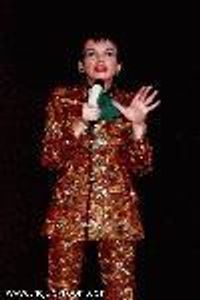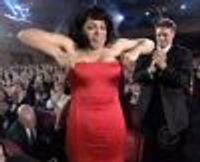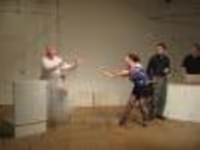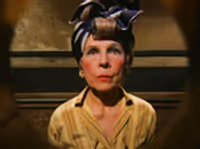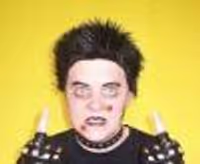More missed shows: Murphy or Reinking????
#0More missed shows: Murphy or Reinking????
Posted: 9/21/04 at 5:58pm
Who missed a higher percentage of shows during their run?
Donna Murphy - Wonderful Town
or
Ann Reinking - Chicago
#2re: More missed shows: Murphy or Reinking????
Posted: 9/21/04 at 6:17pm
Are you guessing? I remember a whole lot of complaining about Reinking's rare appearance on the stage during her run.
#3re: More missed shows: Murphy or Reinking????
Posted: 9/21/04 at 6:35pm
Yes but in Reinking's case, the reasons were known. Injuries, deaths in the family, etc. With Murphy, NOBODY seems to know what the phoo is going on.
Reinking probably did miss more though, as she was ineligible for a Tony nomination because she had been off so much. Murphy, as we know, was nominated.
#4re: More missed shows: Murphy or Reinking????
Posted: 9/21/04 at 7:41pm
Just waiting for the obligitory:
"Why do you always bring up this topic?" "It's NOT your business" post.
WayWicked
Featured Actor Joined: 5/21/04
#5re: More missed shows: Murphy or Reinking????
Posted: 9/21/04 at 7:43pm
heheh.
Very true, Mr. Tuttle!
Plum
Broadway Legend Joined: 3/4/04
#6re: More missed shows: Murphy or Reinking????
Posted: 9/21/04 at 8:00pmIt's our business how much they were out- the reasons, not so much.
#7re: More missed shows: Murphy or Reinking????
Posted: 9/21/04 at 8:18pm
I'm asking for numbers, not reasons.
Unless that wasn't directed towards me.
Plum
Broadway Legend Joined: 3/4/04
#8re: More missed shows: Murphy or Reinking????
Posted: 9/21/04 at 8:39pmNope, not directed towards you. :)
MargoChanning
Broadway Legend Joined: 4/5/04
#9re: More missed shows: Murphy or Reinking????
Posted: 9/21/04 at 8:45pm
I'm also reminded of Jennifer Holliday who missed dozens of performances in "Dreamgirls" during her run as Effie on Broadway (as well as in the LA production). The reasons for her missing were clear -- she simply was blowing out her voice on a regular basis due to the role's extraordinary demands (which she knew well given that she helped create the role and created those demands herself). It became clear a few months into the run that there simply was no way for anyone to do that kind of gospel-infused, scream-and-holler, high belt singing eight times a week and survive. It got to the point halfway through her year-long run in the role where she was missing several performances a week (having come out of the gospel church and never having formally trained vocally, she had no concept of how to pace herself through the role which led to vocal crisis after vocal crisis, week after week, month after month).
Jennifer's problems continued in LA, where she began missing performances and word got out that "the star" wasn't there half the time -- the LA production ended up losing its entire multimillion dollar investment.
In the 20 years since, Holliday has never again starred in a Broadway show (she's played featured roles like Mama Morton in "Chicago" and Teen Angel in "Grease", and starred in shows on the road that didn't make it to Broadway). While part of that is due to the fact that there aren't and haven't been a whole lot of starring roles for black females with that kind of voice (and it also didn't help that she developed a reputation for being a diva and "difficult" to work with), her attendance record is the major factor why -- despite the fact the woman can get a standing ovation any time she opens her mouth -- Holliday has never again starred in a show on Broadway.
CJR
Broadway Legend Joined: 5/14/03
#10re: More missed shows: Murphy or Reinking????
Posted: 9/21/04 at 8:48pmMurphy has missed more than Reinking did in Chicago.
If in Heaven you don't excel, you can always party down in hell...
jo
Broadway Legend Joined: 5/15/03
#11re: More missed shows: Murphy or Reinking????
Posted: 9/21/04 at 9:31pm
Is the high percentage of missed performances more recurring in female performers? Are vocal demands for songs by female performers generally more difficult? I remember that Lea Salonga ( for Miss Saigon) and Sarah Brightman ( for Phantom of the Opera) had regular alternates during the week because of the vocal demands of the role they were playing.
More recently, in an equally demanding role vocally, Hugh Jackman never missed a performance. I understand he prepared himself for the role ( The Boy from Oz) by taking lessons with an opera singer while he was shooting Van Helsing in Prague. While doing OKLAHOMA! in London, he only missed one performance - he started the first song and it came out so badly ( he was ill) that he told the audience it wouldn't be fair to them if he continued the performance and said that his understudy was equally good.
Maybe a pre-announced alternate on certain days during the week might be better than being disappointed with understudies performing too often instead of the regular lead actor/actress.
Plum
Broadway Legend Joined: 3/4/04
#12re: More missed shows: Murphy or Reinking????
Posted: 9/21/04 at 10:14pmThe crazy thing (well, by today's standards) about Jackman's story is that he did Oklahoma! without amplification during part of the run. (Not sure if it was at the West End or the RNT.)
#13re: More missed shows: Murphy or Reinking????
Posted: 9/21/04 at 10:29pm
Margo, it's so interesting to read your post here about Jennifer Holliday's experience since I didn't know about it. How ironic that she helped create the singing part that ultimately destroyed her career on Broadway!
I am just curious about one bit of American theatre history: how and when did the tradition begin that they must have 8 performances each week without any break? Is it only in the American theatre or Europe as well? It seems like a Herculean task, no? Also, I remember in the "Golden Age of Theatre" movie one of the actors said that they used to travel with the show on tour as well as Broadway. I guess they were real troopers in the old days. But how did it all start? I find it fascinating.
#14re: More missed shows: Murphy or Reinking????
Posted: 9/21/04 at 10:32pmOf course they have a break. They have Mondays off - on the "normal" Broadway schedule - which means they're free from Sunday early evening until Tuesday evening. Plus they get vacations.
#15re: More missed shows: Murphy or Reinking????
Posted: 9/21/04 at 11:01pm
Yes, I know about Mondays off, etc., I was more curious about the entire tradition of 8 theatre performances each week and how it all started. It's not like that in the classical music/opera or ballet which is the tradition I know much better. (I should probably go back to that, rather than stay here with musical theatre Donna Murphy battles.)
OK, back to my new Callas-Bernstein CD! :)
#16re: More missed shows: Murphy or Reinking????
Posted: 9/21/04 at 11:08pm
Can I post the "is anyone really upset when Ann misses a performace" thread?
SNAP!
#17re: More missed shows: Murphy or Reinking????
Posted: 9/21/04 at 11:15pmOpera singers rarely perform two days in a row (that's why most opera companies have several operas in rotation at once). There are many musical theatre roles that are just as demanding as opera. Shame that many Broadway actors/actresses are forced to do such damage their voices. Updated On: 9/21/04 at 11:15 PM
MargoChanning
Broadway Legend Joined: 4/5/04
#18re: More missed shows: Murphy or Reinking????
Posted: 9/21/04 at 11:44pm
Not sure when eight shows a week became the standard -- it goes back many decades (at least to the 30's). It was also pretty much standard until about a generation ago, for the star to then tour the show around the country for a year or more after they had completed the Broadway run.
And you're right that the standard schedule is a Herculean task for many lead roles and all the more startling when you consider that body mikes didn't become the norm until the 70's and 80's (floor mikes and primitive body mikes were around in one form or another going back to the 50's). Just how in the world Ethel Merman sang Mama Rose for 700 performances without amplification and still have every syllable heard and clearly sung all the way up to the last row of the Shubert is all but a mystery to this generation (Lansbury, Daley and Peters all had major problems vocally and missed performances trying to sing that role eight times a week -- in spite of the fact that they all wore body mikes to help them get through it).
The work ethic in the old days was that you just didn't miss a show under any circumstances -- colds, fever, sprained ankles, a death in the family -- you worked through it ..... and being an understudy for a star was the most thankless job in show business. I mean no offense to our current generation of performers, but attendance records like Hugh Jackman's or Harvey Fierstein's -- zero missed performances in a year or more -- have become the very rare exception rather than the rule. And as much as people want to argue "well, the shows written these days are harder to sing," I'm sorry, no one can convince me that singing Rose or Don Quixote or Annie Oakley or Cunegonde in Candide or Porgy or Bess or Billy Bigelow without a mike or any amplification whatsoever eight times a week was somehow easier to pull off than anything anyone is doing today with the current state of the art sound designs which are so advanced that a performer can literally whisper and be heard clearly up to the last row of the balcony.
It's a different time and a different era, performers have a different kind of training (that relies heavily on microphones) and a different ethic concerning missing performances (which, unfortunately means it's apparently totally fine to skip a few shows to go to LA to shoot a sitcom pilot or a tv commercial). Mind you, most stage performers are still extremely dedicated and disciplined in what they do and would never miss performances without a very solid reason. I just find it fascinating that the Mermans and Channings and Brynners and Mary Martins and Alfred Drakes and John Raitts NEVER missed -- for decades at a time.
Were they simply made of a stronger stock back then? Is it a question of training and technique (and remember no one in the old days ever went through an MFA program in musical theatre -- there was no such thing in those days) or vocal coaches (which also didn't exist for musical theatre singers until a couple of decades ago) or is it a question of the level of dedication to the audience and their fellow cast members and to the artform as a whole?
#19re: More missed shows: Murphy or Reinking????
Posted: 9/22/04 at 12:14amThank you Margo! You're a great teacher!
jo
Broadway Legend Joined: 5/15/03
#20re: More missed shows: Murphy or Reinking????
Posted: 9/22/04 at 6:17am
I hear actors also observe certain physical regimens ( diet, fitness training, lifestyle, etc) especially if the roles they portray onstage are very demanding. In the NYTimes interview and other interviews, Hugh mentions how he goes to the gym, swims regularly, does yoga and meditation, has a physiotherapist work on his body, observes diet restrictions ( no coffee and not too many outside dinners after the show), and basically observes an almost monk-like lifestyle. I guess the audience never realizes what kind of artistic, mental, and physical preparation stage actors undergo simply to be good in their craft.
Plum - not too many people also knew that Hugh was nursing a fractured foot since before the TONY awards, which needed treatment for every performance. That was why there was a roar from the audience in the last performance when he did the heel click ( My Name in Lights) which had to be eliminated from his routine when he fractured his foot.
Updated On: 9/22/04 at 06:17 AM
WOSQ
Broadway Legend Joined: 7/18/03
#21re: More missed shows: Murphy or Reinking????
Posted: 9/22/04 at 10:05am
Nell Carter missed all or part of 110 performances during the first year of the run of Ain't Misbehavin'. That is out of aprox 416 performances plus previews. That is about one of every four shows.
Her contract was not renewed for a second year although she eventually did the show in LA, in a NY revival and won an Emmy for the TV version.
QueenS
Leading Actor Joined: 8/15/03
#22re: More missed shows: Murphy or Reinking????
Posted: 9/22/04 at 10:21am
If I'm not mistaken, Merman also suffered through vocal troubles during Gypsy and had to miss shows during that run.
And wasn't it through the 50's and 60's that all Broadway shows would close down for the summer since none of the theatres were air conditioned? That gave the casts a couple of months' rest during the year- though admitedly, a lot of the performers (stars included) would then perform in stock theatres around the country on their "break."
MargoChanning
Broadway Legend Joined: 4/5/04
#23re: More missed shows: Murphy or Reinking????
Posted: 9/22/04 at 10:46am
I have read that Merman burst a blood vessel in her throat during Gypsy, but I believe only missed a few performances (the only times she missed during her entire career).
Not sure when A/C became the norm on Broadway, but it was certainly by the 60s.
#24re: More missed shows: Murphy or Reinking????
Posted: 9/22/04 at 10:50am
Well...I think one of the reasons is that the Broadway star of today is no longer a true star. When Merman, Martin and Channing were performing, being a Broadway star was being at the height of the industry. They were recognizable names throughout the country. Today, that's not the case. Few people truly know who Kristen Chenoweth or Audra McDonald are. It takes much, much more to become known. Performers have to branch out to other acting outlets to make the kind of careers that used to be possible solely by acting on the stage.
The only problem I have with that is philosophical. I wish desperately that the stage was still a viable cultural touchstone. But, unfortunately, it is not. I, myself, would quickly depart for Hollywood should that occassion ever arise. The more you're known, the easier it is the pick and choose the projects that actually mean something to you.
Videos


